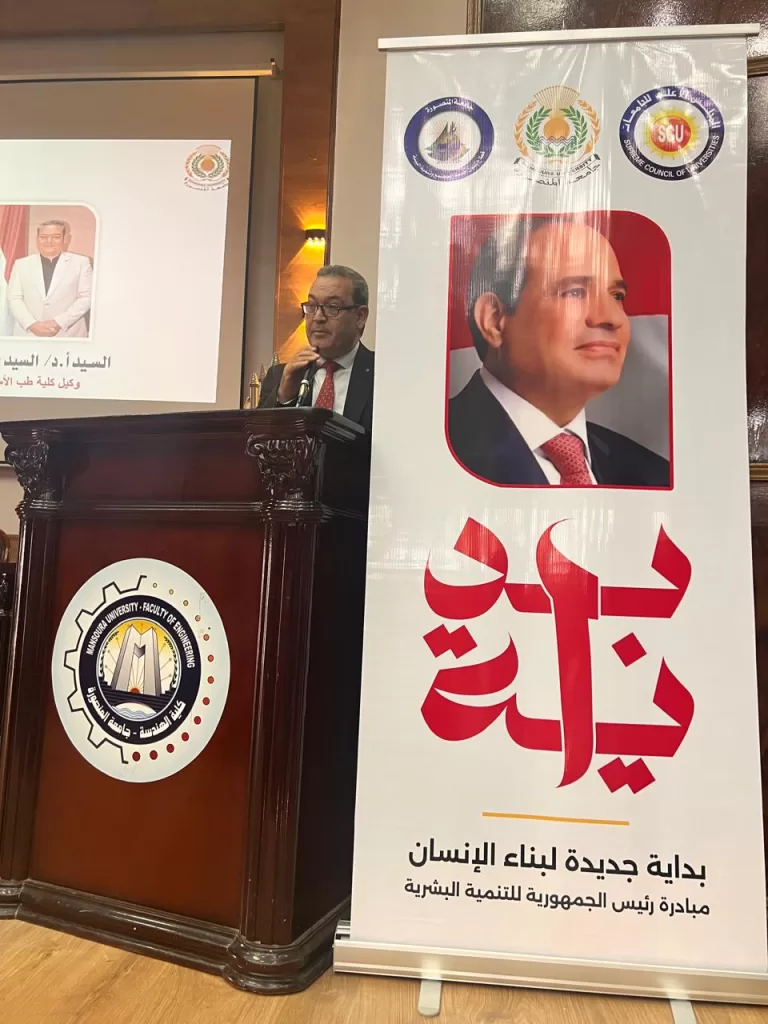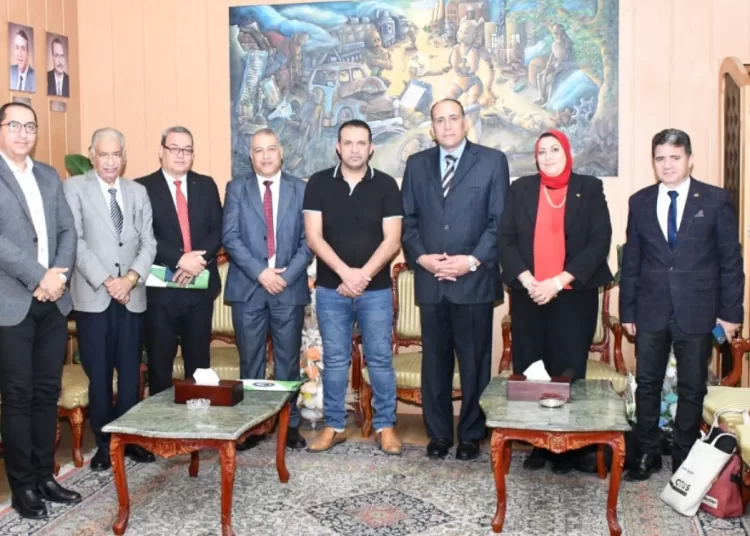Under the patronage of Prof. Dr. Sherif Youssef Khater, President of Mansoura University, a seminar titled “Nuclear Energy and Its Uses in Electricity Generation” was held as part of the university’s collaboration with the Strategic Forum for Development and Social Peace. The seminar aimed to explore the pivotal role of nuclear energy in Egypt’s sustainable development and future energy strategy. The event was organized by the Strategic Forum for Development and Social Peace in cooperation with the General Administration of Environmental Projects and the Faculty of Dentistry.
Key university officials present at the event included Dr. Mohamed El-Bayoumi, Vice President for Education and Students, Dr. Mohamed Abdel-Azim, Vice President for Community Service and Environmental Development, and Dr. Tarek Mustafa Ghouloush, Vice President for Graduate Studies. This initiative was part of the broader framework of the Bedaya Initiative for Human Development, which seeks to engage young people in important development issues through dialogue and education.

Seminar Highlights Nuclear Energy’s Role in Development
The seminar opened with Dr. Samia Abu El-Nasr, a journalist and moderator of the event, who emphasized the importance of the Strategic Forum in addressing key national issues across various sectors, including economics, health, education, and more. She highlighted the ongoing collaboration between the Forum and Mansoura University, stressing the importance of engaging youth in discussions about Egypt’s development challenges.
A video was presented to the audience outlining the significance of nuclear energy, followed by remarks from Prof. Dr. Sayed Gad, who expressed his enthusiasm about hosting the seminar at the university, a leading institution in Egypt and the Arab world. Prof. Dr. Sherif El-Badawy, Dean of the Faculty of Engineering, Mansoura University, also welcomed the event, emphasizing the faculty’s commitment to supporting nuclear energy initiatives and promoting public awareness of the benefits of nuclear energy.
Addressing the Future of Nuclear Energy in Egypt
Prof. Dr. Alaa Rizk, Head of the Strategic Forum for Development and Social Peace, delivered a powerful keynote speech on the role of science and electricity in driving global development. Dr. Rizk noted that the rapid advancement of science over the past century was largely driven by the invention and use of electricity—one of humanity’s greatest inventions. He highlighted how nuclear energy could further enhance Egypt’s ability to meet its growing energy demands, pointing out that the continued development of nuclear power is vital to ensuring the country’s industrial growth.
Dr. Rizk also underscored the importance of collaboration between the private sector, civil society organizations, and the government, stressing that a unified approach involving all sectors was key to achieving sustainable development. This “development triangle” is essential for building a robust national strategy.
Other distinguished speakers included Prof. Dr. Imad El-Din Barai, Head of the Hot Labs Center at the Atomic Energy Authority, who provided an update on Egypt’s progress with nuclear energy. Dr. Barai reassured the audience that the country had already begun producing energy components and was in the process of establishing the Dabaa Nuclear Power Plant, an essential step in Egypt’s energy future. He also discussed the development of awareness programs to address public concerns about nuclear energy, emphasizing the sustainability of Egypt’s nuclear program.
The Role of Nuclear Energy in Egypt’s Medical and Technological Development
Several speakers emphasized the diverse applications of nuclear energy, particularly in medicine and technology. Dr. Al-Shaarawy Kamal, Director of University Hospitals at Mansoura University, spoke about how nuclear energy is essential for advancing medical research and the treatment of diseases such as cancer. Prof. Dr. Shaza Hamed, Professor of Dentistry at Mansoura University, discussed the importance of integrating nuclear energy into university curricula to better equip students for future challenges in science and engineering.
Dr. Amani Aziz, a former member of Egypt’s House of Representatives, highlighted the importance of media in spreading awareness of nuclear energy’s peaceful uses. She stressed the need for greater female participation in the nuclear energy sector, pointing out that empowering women is crucial for the country’s development.
Prof. Ahmed Raslan, Rapporteur of the Strategic Forum in Dakahlia Governorate, discussed the significance of engaging Egypt’s youth population, which makes up over 60% of the country’s total population. He emphasized the importance of educating young people about nuclear energy to prevent the spread of misinformation and rumors, ensuring they understand its potential benefits.
Key Recommendations for the Future
At the conclusion of the seminar, several key recommendations were made to promote nuclear energy and its peaceful applications in Egypt:
- Establish an integrated medical city next to the Dabaa Nuclear Power Plant to enhance medical research and treatment facilities.
- Incorporate nuclear engineering programs into the curricula of engineering faculties at universities across Egypt.
- Increase awareness of the peaceful uses of nuclear energy by organizing events and lectures at universities and institutions across the country, involving intellectuals, media figures, and professionals from various sectors.
- Award the Scientific Excellence and Creativity Award for Youth to encourage innovation in nuclear energy and related fields.
Honoring Key Participants
The seminar concluded with a ceremony honoring the event’s key participants. Dr. Sherif El-Badawy, Dean of the Faculty of Engineering, was honored by the organizers for his support of the seminar and his ongoing efforts to promote nuclear energy in Egypt. Dr. Alaa Rizk, President of the Strategic Forum, presented a special shield to Prof. Dr. Sherif Khater, President of Mansoura University, in recognition of his leadership and contributions to advancing education and development in Egypt.
This event served as an important platform for fostering public understanding of nuclear energy’s potential in driving Egypt’s sustainable development, and it highlighted the importance of continued collaboration across sectors to ensure a brighter and more energy-secure future for the country.






Discussion about this post